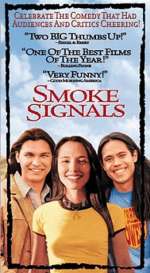But Smoke Signals threatened to change all that. The first major film written, directed and acted by Native Americans, Smoke Signals was both a critical and commercial success. Selected for the dramatic competition at Sundance and winner of the festival’s Audience Award, it was bought by Miramax and went on to bank $6.8 million at the box office on a budget of less than $2 million. More importantly, it offered Native Americans starved for positive and accurate depictions of themselves something they could watch and be proud of.
The film’s success appeared to be a harbinger of a new wave of Native filmmaking. What’s happened since? “Absolutely nothing,” according to Alexie.


No, The Business of Fancydancing wasn't a road-trip movie. Just because someone drives a car in it doesn't make it one.
ReplyDeleteTwo road-trip movies (Powwow Highway and Smoke Signals) don't make a trend. Traditionally, a trend requires at least three instances.
Alexie and Eyre didn't stop making movies together because they ran out of ideas. They stopped because they had a falling out. As you would've known if you had read the article.
The article discusses why Native movies didn't take off after Smoke Signals. One answer is too many similar movies. But the similarities involve depressing rez lives, not uplifting road trips.
The so-called failures include The Business of Fancydancing and Skins. We could add The Other Conquest and Windtalkers. None of these involves a road trip.
I doubt you could come up with a single explanation for all four--unless people simply don't want to watch Native movies. But the success of such movies as Dances with Wolves, Pocahontas, and The Emperor's New Groove shows that isn't the case. The right Native movie will do as well as any other movie.
A road-trip movie usually involves two or more people traveling on the road for a significant portion of the movie. Simply traveling or driving a car isn't enough.
ReplyDeleteI was talking about box-office success, since that's the subject of this posting. In this particular case, critical success has nothing to do with it.
I think most people would say Smoke Signals, The Business of Fancydancing, Skins, and The Other Conquest were critical successes. But as we know, critical success doesn't translate to box-office success.
I'd say Dances with Wolves, Pocahontas, and The Emperor's New Groove were pretty good Native-themed movies. I noted their flaws and stereotypes but enjoyed them for what they were.
Writerfella here --
ReplyDeletePerhaps, to you, but for Natives, a 'road trip' is any kind of venture outside of their 'Rez' existences. Or did you miss that particular point? The rest of American culture is alien to them, though we all now speak that alien language. So, leaving the 'Rez' MUST be a 'road trip' if only because America has become an alien planet to Natives, or as it has been said, they have become 'strangers in their own land'...
All Best
Russ Bates
'writerfella'
This is your invention, not a standard definition. When you find any other Natives who define a road-trip movie this way, go ahead and quote them.
ReplyDeleteWriterfella here --
ReplyDeleteSorry for your case, Rob, but writerfella did not invent modern Native American reality. He simply has had to live within it and make of it something that became his own, which he has done quite to some success. It is a reality which you cannot fathom ever at all. That you yourself are striving to define such a reality only means that you are a part of the problem and not in any way a part of the solution, if there is one. Else, what you are pursuing would have made things better, if at all. AIM also thought they were doing things for the better, but the only things that got better were for them alone...
All Best
Russ Bates
'writerfella'
You invented your nonsensical definition of "road trip." Presumably that's because you don't know the actual definition, as you've demonstrated.
ReplyDeleteAs usual, you can't or won't document your made-up definition. You're the only one defining the "Native reality" here--defining it for other Natives because you think you know better than they do.
If John Fusco can fathom the "Native reality," so can any white writer. Readers can judge for themselves whether I've done it or not.
As I told you before, if I'm wasting my time posting blog entries, you're wasting your time responding to them. In other words, you're exactly as effective or ineffective as I am.
I personally was waiting for more films with a true Native Perspective, I'd have been willing to watch another good "road picture" if one had been written. Heck, Y Tu Mama Tambien is a road picture. To say all pictures of a certain type are identical is to say that there is no such thing as genre. How many coming of age films can the world stand? Obviously if they are about you white kids as many as Hollywood screenwriters can crank out. Joy Luck Club was supposed to usher in a era of Chinese American films, either that or Better Luck Tomorrow, didn't see that renaissance either. Blacks film that break stereotypes linger in development hell, so I believe Alexie's statement has much merit. Anyone who has any knowledge of film history certainly wouldn't completely dismiss it.
ReplyDelete